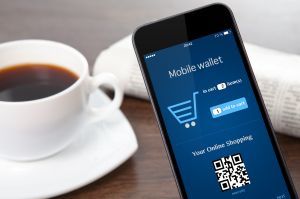Key Factors Limiting Mobile Payment Adoption

Today, everyone’s attached to their smartphones. Whether it’s for using social media, communicating with friends, tracking workouts, getting directions, or reading the news. The amount of time spent connected to a phone is endless.
Some consumers with mobile devices are even making purchases via mobile wallets in a bid to make their lives easier. In simple terms, a mobile wallet is a virtual wallet that stores credit and debit card information on smartphones, tablets, and smartwatches. Consumers use mobile wallets largely for in-person transactions. But it hasn’t grabbed a firm hold with all the mobile device use in the world.
What’s Hurting Adoption Rates?
According to pymnts.com, only 21% of people with Apple Pay, 14% with Samsung Pay and 10% with Android Pay on their phones have used it. And of the ones that do try using it, most of them went straight back to using their credit cards.
Why is this? Here are a few key reasons why the widespread use of the mobile wallet is limited, according to digitaltrends.com.
1. Old Habits Die Hard
For those who do want to purchase goods and services via a mobile wallet, merchants are sometimes holding onto old habits and asking their customers to purchase through chip or swipe. If a merchant doesn’t have the ability to accept payments through a consumer’s mobile wallet, then the customer experience may sour. No one likes to take multiple steps to make a purchase, only to find out at the register that their method of payment isn’t accepted.
And it isn’t only merchants whose habits are steadfast, it’s consumers as well. They don’t want to change the way they make payments by inserting their cards into terminals. It can just be faster to remove a card from your wallet and insert or swipe it, compared to taking out your phone, unlocking it, and completing a purchase.
2. Credit Cards Work Everywhere
Because mobile payments aren’t used at every business, many consumers aren’t sure how mobile wallets work. Daniel Csoka, Managing Director of Mobile Money Matters, told digitaltrends.com, “It needs to work everywhere, every time. That’s why my card works so well, because it always works everywhere. We still don’t have ubiquity on mobile payments–some are NFC, some are QR codes, Apple Pay can’t talk to Android Pay, and with all these different payments sources, the merchant has to decide what to support.”
3. Security
Many consumers are simply concerned with the security of mobile payments. A recent Mastercard survey shows that 77% of Americans are anxious about their financial information and social security numbers being stolen or compromised.
Csoka says many consumers don’t know that ‘a mobile payment transaction is safer than a card transaction’. Smartphones add more security because of behavioral biometrics. NuData, a security firm recently acquired by Mastercard, can analyze data from online, mobile app, and smartphone interactions. This allows them to tell the difference between fraudsters and authentic users–making it more secure than other forms of payment.
What Does This Mean for Your Business?
Preparation is key. Many consumers aren’t ready to move towards a fully mobile payment world, but there are still plenty that are ready to pay with their mobile wallets right now. The first step to accommodate these consumers, is to equip your business to accept Apple Pay, Samsung Pay, and Android Pay. With time and availability, more and more consumers will realize the benefits of mobile processing and begin to use it everywhere.
Remember–it doesn’t hurt to be proactive and it can only help your bottom line.
Contact Infintech to Learn More About Mobile Payment Acceptance:
Contact us online or call 1-800-621-8931.















